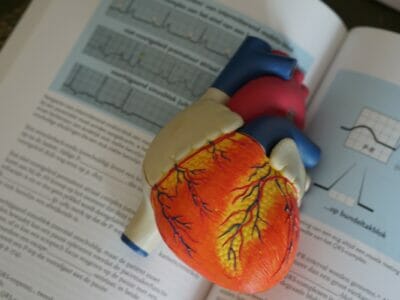As one of the most crucial components of our body, the heart is responsible for the proper circulation and distribution of blood throughout our system. And while a healthy lifestyle plays an essential role in maintaining cardiovascular health, it’s essential to know that some nutrients can also promote optimal heart function – including B vitamins. These vitamins have been found to help prevent several cardiovascular diseases such as hypertension, stroke, and coronary artery disease (CAD). In this article, we’ll explore B vitamins’ effects on cardiovascular health in more detail and discover why they should be included in every heart-healthy diet plan.
The Importance of B Vitamins in Cardiovascular Health
B vitamins are a group of nutrients that play an essential role in maintaining good health. They have been found to be particularly important for the proper functioning of the cardiovascular system. These vitamins, which include B1, B2, B3, B5, B6, and folate or folic acid (B9), help in regulating homocysteine levels in the blood. High levels of this amino acid are known to increase the risk of heart disease.
 The importance of getting enough B vitamins for cardiovascular health cannot be overstated. Studies have shown that individuals who consume sufficient amounts of these essential nutrients show improvements in heart function. Additionally, consuming foods rich in these vitamins has been linked with reduced risks of hypertension and stroke.
The importance of getting enough B vitamins for cardiovascular health cannot be overstated. Studies have shown that individuals who consume sufficient amounts of these essential nutrients show improvements in heart function. Additionally, consuming foods rich in these vitamins has been linked with reduced risks of hypertension and stroke.
With more research being conducted on this topic every day, it is clear that paying attention to our intake of B vitamins is a crucial part of maintaining optimal cardiovascular health.
How B Vitamins Help Lower Blood Pressure
B vitamins have been widely recognized for their role in improving cardiovascular health. In particular, they are known to help lower blood pressure levels. Studies have shown that vitamin B12 and folate can decrease the concentration of homocysteine in our blood, a substance that’s been linked to an increased risk of hypertension and heart disease. By reducing homocysteine levels, B vitamins can improve vascular function and reduce inflammation within the arterial walls.
Furthermore, vitamin B6 has also shown potential as a natural means of lowering blood pressure. This nutrient helps regulate the production of nitric oxide, a compound that dilates our blood vessels and improves circulation by allowing more oxygen-rich blood to reach vital organs such as the brain and heart. Additionally, vitamin B6 supports the uptake of magnesium into cells which reduces high blood pressure through its vasodilatory effects on arteries.
Overall, incorporating adequate amounts of B vitamins into one’s diet may offer considerable benefits for those looking to maintain healthy cardiovascular status or manage hypertension or other chronic conditions associated with elevated blood pressure levels.
B Vitamins and Their Impact on Cholesterol Levels
B vitamins, specifically vitamin B6, B9 (folate), and B12, are known for their importance in various bodily functions. These vitamins have been found to have a positive impact on cholesterol levels and cardiovascular health. The combination of these three vitamins has shown to reduce homocysteine levels in the blood, which is a risk factor for heart disease.
A deficiency in any of these essential vitamins can lead to increased levels of homocysteine and high cholesterol, increasing the risk of developing heart disease. Supplementing diets with adequate amounts of all three B-vitamins may lead to better regulation of high cholesterol levels and help prevent plaque buildup within arteries that supply blood to the heart.
Overall, maintaining healthy intake levels of vitamin B6, folate-folic acid- and vitamin B12 through diet or supplements supports optimal cardiovascular health by regulating cholesterol metabolism. Along with regular exercise practice & healthy lifestyle habits such as not smoking or no excessive alcohol consumption – choicess that altogether promote low risks towards potential chronic diseases’ development including ultimately preserving good cardiac functioning for longer periods throughout life expectancy-span expectations.
The Role of B Vitamins in Preventing Stroke
B vitamins have been found to play a key role in preventing stroke, which is one of the most significant cardiovascular diseases. These vitamins, including folate, B6, and B12, can regulate homocysteine levels – an amino acid that has been linked to increased stroke risk – by breaking it down into other components. Studies have shown that individuals with higher levels of homocysteine may be at heightened risk for developing ischemic stroke or cerebral infarction.
 Additionally, B vitamins promote optimal heart function by regulating blood pressure and reducing inflammation in the circulatory system.
Additionally, B vitamins promote optimal heart function by regulating blood pressure and reducing inflammation in the circulatory system.
This helps prevent hypertension and coronary artery disease (CAD), both of which are common causes of strokes.
It’s worth noting that getting adequate amounts of these essential nutrients can be challenging through diet alone – fortified cereals or whole grains products are some examples where B Vitamins can be easily incorporated on your meals– so supplements might sometimes become necessary.
In conclusion, incorporating more foods rich in vitamin B complex and taking recommended daily doses could potentially help reduce ischemic stroke incidences; nevertheless certain researches showing mixed results demands a deeper understanding about how exactly Vitamin Bs work on preventing such dreadful events from happening.
B Vitamins and Coronary Artery Disease: What You Need to Know
B vitamins are essential nutrients known to promote optimal cardiovascular health. Several studies have shown that these vitamins, particularly vitamin B6, vitamin B12, and folic acid (vitamin B9), can help reduce the risk of developing coronary artery disease (CAD). A deficiency in these crucial vitamins has been linked to a higher risk of hypertension, stroke, and other heart-related illnesses.
One way that B vitamins combat CAD is by reducing homocysteine levels. High levels of this amino acid have been linked to an increased risk for CAD. B-vitamins work together to metabolize homocysteine into useful compounds, effectively decreasing harmful levels in the bloodstream.
It is important to note that while supplements may provide extra doses of these vital nutrients; a well-balanced diet rich in whole grains, leafy green vegetables, lean meats like fish and poultry as well as fortified breakfast cereals provides most people with enough daily intake requirements for these essential vitamins.

The Link between B Vitamins and Homocysteine Levels in Cardiovascular Health
Research has shown that homocysteine, an amino acid found in the blood, is a contributing factor to various cardiovascular diseases. Elevated levels of homocysteine have been linked to increased risks of heart attacks, strokes, and peripheral vascular disease. B vitamins play a critical role in regulating homocysteine levels by breaking it down and preventing its buildup in the bloodstream.
Studies have suggested that supplementing with specific B vitamins including folate (B9), vitamin B6 (pyridoxine), and vitamin B12 can reduce homocysteine levels, thus decreasing cardiovascular risks. Additionally, deficiencies of these essential nutrients have been associated with higher concentrations of homocysteine and poorer cardiovascular outcomes.
Overall, understanding the link between B vitamins and homocysteine can shed light on possible preventative measures for maintaining optimal heart health. Incorporating adequate amounts of these vital nutrients into your diet or taking supplements may contribute to lowering your risk for developing certain forms of heart disease.
B Vitamins and the Prevention of Congestive Heart Failure
B vitamins, a group of water-soluble vitamins, are known to play an essential role in maintaining the health of our cardiovascular system. According to research studies, including B vitamins in your diet helps prevent heart diseases like congestive heart failure (CHF) by promoting healthy blood flow and reducing inflammation in the arteries. Furthermore, these vitamins can also help reduce homocysteine levels – a chemical that increases the risk of CHF.
 There is ample evidence suggesting that having sufficient amounts of B complex vitamins such as riboflavin (vitamin B2), niacin (vitamin B3), pyridoxine (vitamin B6), and cobalamin (vitamin b12) protects against CHF development by preventing dysfunction of cardiac myocytes or cells within the heart muscle.
There is ample evidence suggesting that having sufficient amounts of B complex vitamins such as riboflavin (vitamin B2), niacin (vitamin B3), pyridoxine (vitamin B6), and cobalamin (vitamin b12) protects against CHF development by preventing dysfunction of cardiac myocytes or cells within the heart muscle.
Research shows that individuals who suffer from vitamin-B deficiencies were at a higher risk of developing fatal CHF than those with optimal levels. Therefore it’s crucial to include foods like poultry, fish, whole grains and leafy greens into your daily diet to get enough Vitamin Bs to lower your chances for developing CHF.



 Vitamin B and Stress Management: The Best Vitamins to Reduce the Impact of Stress
Vitamin B and Stress Management: The Best Vitamins to Reduce the Impact of Stress
